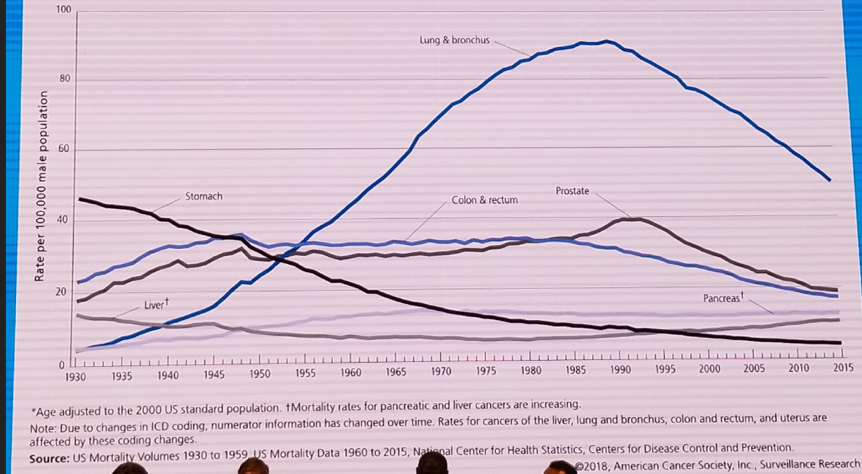The three most common new cancers in men include prostate (19%), lung and bronchus (14%), and colon and rectum (9%), while in women it is breast (30%), lung and colon (13%), and colon and rectum (7%). The three most common cancers that men die from are lung and bronchus (26%), prostate (9%), and colon and rectum (8%). In women, it is lung and bronchus (25%), breast (14%) and colon and rectum (8%). Fortunately, the death rates adjusted by age have been going down in almost all cancers in recent years, except perhaps, pancreatic cancer, as can be seen in figure 1.

Figure 1 – Trends in age-adjusted Cancer death rates by the site in males. 1930-2015:
The three most common cancers in men were then discussed in more detail, beginning with lung cancer. Overall, there a 1 in 15 chance that a man will develop lung cancer in his lifetime. The American Cancer Society estimates that for lung cancer in the US for 2018 there are approximately 121680 new cases in men and about 83550 deaths from lung cancer in men. Cigarette smoking is the number one risk factor, and the presenting symptoms may include a cough, weight loss, dyspnea, chest pain, and hemoptysis. Initial management is largely dependent on the stage of the disease.
Dr. Ajay Nehra moved on to discuss prostate cancer. Approximately 1 in 9 men will be diagnosed with prostate cancer during his lifetime. About 6 in 10 cases of prostate cancer are found in men older than 65. According to the American Cancer Society, in 2018 there will be 164690 new prostate cancer cases, and approximately 29430 patients will die from this cancer. Early prostate cancer may manifest without signs or symptoms. Advanced cases may present with urinary frequency, hesitancy, and hematuria. Screening for prostate cancer remains a controversial issue, and screening tests include the PSA blood test and a digital rectal examination. Gold standard diagnosis requires a prostate biopsy.
Lastly, colon cancer was discussed. The overall lifetime risk of developing colorectal cancer is about 1 in 22 (4.5% for men). The known risk factors include age above 50, positive family history of colorectal cancer, or polyposis syndrome, and inflammatory bowel disease. The common symptoms include abdominal pain, change in bowel habits, hematochezia (blood in the stool), anemia, and weight loss. The US guidelines recommend routine screening for this common cancer, with a clear protocol, which includes various mandated tests. These include stool DNA test, sigmoidoscopy, colonoscopy, CT colonography, and others.
Adhering to routine screening protocols, adopting a healthy lifestyle and attempting to avoid any risk factors, are critical in trying to lower the rate of diagnosis of these diseases. Once the diagnosis of one these diseases has been established, it is critical to engage in early and aggressive treatment, to maximize the chances of survival.
Presented by: Ajay Nehra, Massachusetts General Hospital, Boston, United States
Written By: Hanan Goldberg, MD, Urologic Oncology Fellow (SUO), University of Toronto, Princess Margaret Cancer Centre Twitter: @GoldbergHanan at the 38th Congress of the Society of International Urology - October 4- 7, 2018 - Seoul, South Korea


